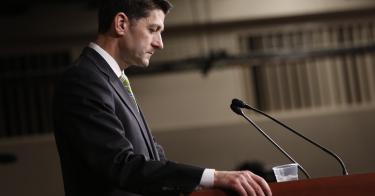“This is not the end of the debate.” Rep. Mark Meadows said that on ABC’s “This Week” regarding the House leadership’s failed health care bill, and he’s exactly right.
Even President Trump, as he was voicing disappointment over its legislative fate, couldn’t help noting “what’s going to come out of it is a better bill.”
That’s the key. The president and many other lawmakers campaigned on a clear-cut promise to repeal Obamacare. And while the House leadership’s bill did contain some good features, it simply failed to do the job. It left many of the law’s most damaging regulations in place.
Obamacare can’t be fixed. An overhaul, however much of an improvement it might appear to be, isn’t what we need (let alone what was promised). The so-called “Affordable Care Act” has to be cut out root and branch.
It has to be done right because people are really hurting. They’re facing steeply higher premiums and deductibles, for one thing. According to a Gallup poll, Those paying some or all of their health premiums increasingly say their premiums have gone up (74 percent in 2015, up from 67 percent in 2014).
They also have fewer health plans to choose from. An increased regulatory burden has driven some providers from the market. That’s part of the reason that President Obama’s promise that if you like your doctor or plan, you can keep it rings so hollow. For many Americans, that hasn’t been their experience at all.
Plus, notes health care expert Ed Haislmaier, Obamacare allows people to wait until they need medical care to enroll in coverage. This effectively destabilized the individual insurance market. It created an adverse-selection process that helped jack up premiums, “as the law’s “carrot-and-stick” approach of low-income subsidies coupled with a fine for not buying coverage failed to enroll enough healthy individuals,” he writes.
Sure, the House leadership bill would’ve repealed several of Obamacare’s insurance regulations, such as the age-rating restrictions that artificially inflate premiums for young adults. But the law’s federal coverage mandates would have remained intact.
The first attempt at Obamacare repeal may well have failed, according to Mr. Haislmaier, because lawmakers lost sight of the “why.” We need to remind ourselves why many people are having a bad experience with Obamacare: Its basic construct is untenable. Its purpose, he writes, was to “take control of private health plans and convert them into off-budget extensions of federal programs.”
Don’t take it from me. Take it from one of its supporters, Sara Rosenbaum, who in 2010 wrote in the New England Journal of Medicine that Obamacare “transforms health insurance into a public accommodation,” and turns private health insurance into “a regulated industry that, in its restructured form, will therefore take on certain characteristics of a public utility.”
Yes, a public utility. Americans didn’t sign up for that. They wanted (and still want) reform that gives them greater control over their own health care, not a government-run system.
As Rep. Jim Jordan said after the House leadership bill was pulled, “Let’s stop doing the blame game and get back to work and do what we told the American people we were going to accomplish, which is repeal Obamacare and replace it with a patient-centered health care program.”
As Mr. Meadows said, the debate is far from over. We now have a chance to go back to the drawing board and do this right. The American people deserve a genuine cure. Will we give it to them?
This piece originally appeared in The Washington Times




